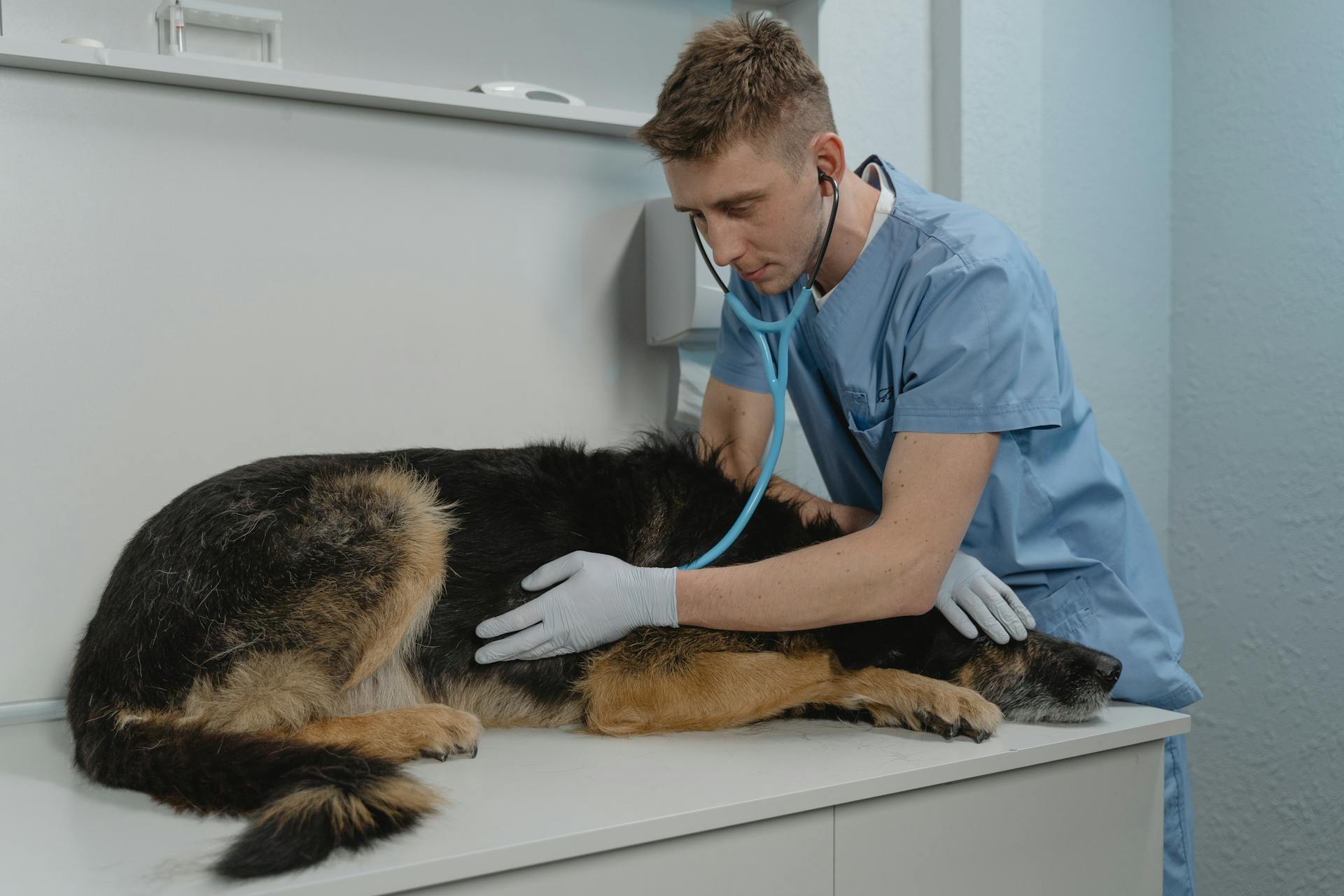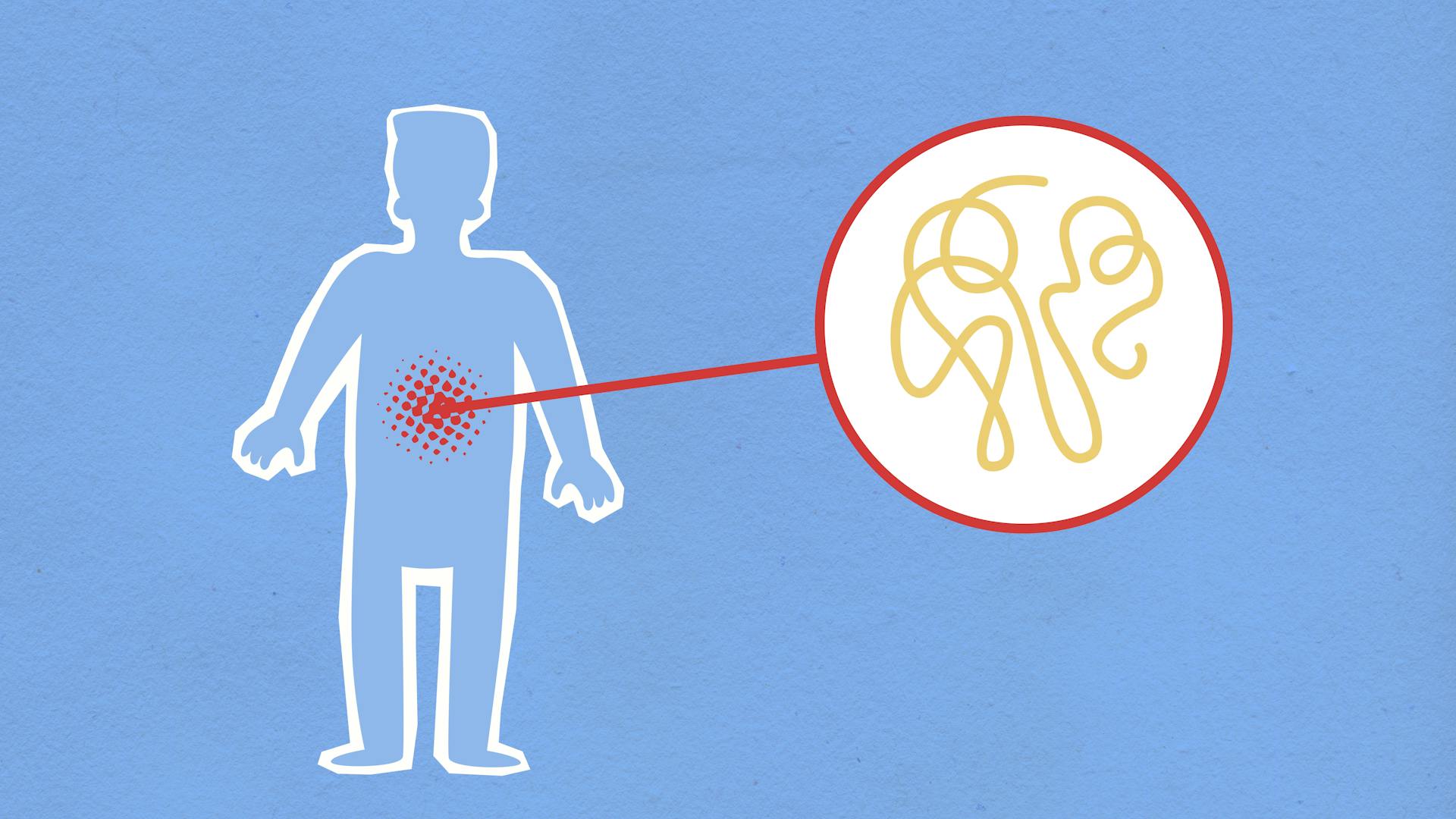
Schnauzers are prone to pancreatitis, a painful and potentially life-threatening condition that requires immediate veterinary attention.
The goal of treatment is to manage symptoms, prevent complications, and support the dog's recovery.
Rest and relaxation are crucial during the recovery period, as excessive physical activity can exacerbate pancreatitis.
Medications such as pain relief and anti-nausea medications can help alleviate symptoms.
A bland diet, often consisting of boiled chicken and rice, can help soothe the pancreas and promote healing.
In severe cases, hospitalization may be necessary to provide around-the-clock care and monitoring.
What Is Pancreatitis?
Pancreatitis is a serious illness that can cause damage to your dog's other organs.
Dogs can develop pancreatitis suddenly, without warning, or it can develop slowly over time.
The pancreas is a small fleshy organ between the stomach and the small intestine, and it plays a crucial role in digestion and regulating blood sugar levels.
Eating fatty foods or table scraps can trigger pancreatitis in dogs, and it's essential to carefully monitor their diet to prevent it.
Some common signs of pancreatitis in dogs include vomiting, lethargy, loss of appetite, abdominal pain, and fever, but in mild cases, dogs may only seem listless and have diarrhea.
If left untreated, pancreatitis can become chronic, leading to weight loss and lethargy.
Dogs with severe pancreatitis may show obvious signs, such as vomiting, dehydration, fever, and belly pain, and it's essential to seek prompt veterinary care if you suspect your dog has pancreatitis.
In some cases, dogs may display a praying position to relieve abdominal discomfort associated with an inflamed pancreas.
Early intervention is critical in helping dogs feel better and preventing worsening of symptoms, so don't hesitate to take your dog to the vet if you suspect pancreatitis.
Broaden your view: Pain Relief for Pancreatitis in Dogs
Causes and Symptoms
High-fat diets are a major cause of pancreatitis in Schnauzers, especially if they consume one large serving of fatty food in a single sitting. A diet high in starches and grains can also cause enormous stress on the pancreas.
Additional reading: Can Stress Cause Pancreatitis in Dogs
Some breeds, including Schnauzers, are more prone to pancreatitis due to their digestive track not being designed to effectively handle certain ingredients.
Dietary indiscretion history is also a contributing factor, as Schnauzers can eat anything, including non-food items, especially low-quality, high grain, highly processed kibble.
Common signs of pancreatitis in dogs include loss of appetite, repeated vomiting, weakness or listlessness, and belly pain. These symptoms can be subtle, and it's essential to monitor your Schnauzer's behavior and health closely.
Signs that your dog's condition is getting worse include a bloated, hard belly, vomiting and diarrhea that isn't getting better, trouble breathing or swallowing, seizures, not being able to drink, and not being able to stand up on their own.
A table summarizing common causes of pancreatitis in Schnauzers:
What Causes Pancreatitis?
Pancreatitis in dogs can be a serious and sometimes mysterious condition. A high-fat diet is the most common cause of pancreatitis in dogs, especially if they eat a lot of fatty food in one sitting.
Some breeds are more prone to pancreatitis, including miniature schnauzers, Yorkshire terriers, cocker spaniels, dachshunds, poodles, sled dogs, and some other toy or small terrier breeds.
Your dog's genes can also play a role in pancreatitis. If your dog has a history of eating whatever they can find to eat, it can increase their risk of pancreatitis.
Certain medicines or toxins can also cause pancreatitis in dogs. These include cholinesterase inhibitors, calcium supplements, potassium bromide and phenobarbital, L-asparaginase, estrogen, aspirin and aspirin-containing medicines, azathioprine, thiazide diuretics, and vinca alkaloids.
Here are some common causes of pancreatitis in dogs:
- High-fat diet
- History of eating whatever they can find to eat
- Genetic predisposition (some breeds are more prone)
- Certain medicines or toxins
If you suspect your dog has pancreatitis, it's essential to seek veterinary care right away. Early intervention can help prevent worsening of symptoms and improve your dog's chances of recovery.
Signs in Dog
If your dog is showing signs of pancreatitis, it's essential to know what to look out for. The most common signs of severe pancreatitis in dogs include loss of appetite or refusal to eat, repeated vomiting, and weakness or listlessness.
Any dog that seems weak, listless, or unwell needs to visit the vet. Belly pain is also a possible symptom, although it's not often reported in dogs. You may notice your dog standing with a hunched back or looking uncomfortable or bloated.
Dogs with milder cases of pancreatitis may not have such obvious signs, or they may only have a few symptoms that could be caused by many different things. For example, no appetite, listlessness, and diarrhea are all possible symptoms, but they don't necessarily mean your dog has pancreatitis.
Here are some signs that your dog's condition is getting worse and they need to go to the vet as soon as possible:
- A bloated, hard belly
- Vomiting and diarrhea that isn't getting better, especially if it has been more than 24 hours
- Trouble breathing or swallowing
- Seizures
- Not being able to drink
- Not being able to stand up on their own
It's also worth noting that dogs with worsening pancreatitis are often severely dehydrated, lethargic, and weak, and in pain. If your dog's pancreatitis is worsening, hospitalization and supportive care is needed.
Diagnosis
A diagnosis of pancreatitis in dogs is often made based on a combination of physical symptoms and diagnostic tests.
Dogs with sudden onset vomiting, abdominal pain, or loss of appetite are more likely to be tested for pancreatitis using the cPLI test.
A small blood sample is required for the cPLI test, which measures pancreas-specific lipase.
Dogs at increased risk for pancreatitis, such as Miniature Schnauzers, may benefit from regular cPLI testing.
A physical exam, including a check of the belly, gums, heart, and temperature, may be performed to assess your dog's overall health.
Blood tests can help measure the amount of enzymes your dog's pancreas is making, and a positive test for pancreatic lipase immunoreactivity (PLI) is a strong indication of pancreatitis.
X-rays or ultrasound may be used to rule out other conditions that could cause your dog's symptoms, such as a foreign-body obstruction of the stomach and/or intestine.
In some cases, a fine needle aspirate of the pancreas may be performed to look for signs of swelling and infection.
Here are some common signs that may prompt a vet to test for pancreatitis:
- Dogs with signs of sudden onset vomiting, abdominal pain, or loss of appetite
- Dogs with recurring episodes of vomiting or poor appetite
- Dogs at increased risk for pancreatitis, such as Miniature Schnauzers or dogs receiving potassium bromide anticonvulsant therapy.
Treatment
Treatment for schnauzer pancreatitis requires prompt veterinary attention. Your vet will try to determine the cause of the pancreatitis, which may involve switching to a low-fat or ultra low-fat prescription food.
In the first 24 hours, your vet may recommend withholding food and water if your dog can't keep anything down. Then, over the next week or so, your vet may prescribe:
- Pain medicine
- IV fluids, especially if your dog has severe pancreatitis
- Medicine to prevent vomiting (such as dolasetron, maropitant, or ondansetron) and dehydration
- A low-fat diet
- Close watching for a worsening condition
- Fuzapladib sodium (Panoquell-CA1), a medicine specifically for dogs with rapid-onset pancreatitis
Your vet may also recommend closely watching your dog's diet to ensure they're not eating a lot of fatty foods, and feeding them small meals spaced out over the day.
Treatment of Dog
Treatment of dog pancreatitis involves supportive care, regardless of whether the patient has acute or chronic pancreatitis. This means that your vet will focus on helping your dog feel as comfortable as possible until the attack passes.
Your vet may recommend withholding food and water for the first 24 hours if your dog can't keep anything down. After that, they may prescribe pain medicine, IV fluids, anti-nausea medication, stomach-protectant medications, and nutritional support through a feeding tube.
A bland, low-fat diet is often recommended during recovery, which may be a home-cooked and/or home-prepared diet. Your vet may also prescribe appetite stimulants and antibiotics in some cases.
The cost of treating pancreatitis can vary greatly, ranging from $500 to $5,000, depending on the severity of the symptoms.
Here are some common medications used to treat pancreatitis in dogs:
- Pain medications
- IV fluids
- Anti-nausea medication (such as dolasetron, maropitant, or ondansetron)
- Stomach-protectant medications
- Nutritional support through a feeding tube
- Appetite stimulants
- Antibiotics (in some cases)
- Cyclosporine, prednisone, or prednisolone (for chronic pancreatitis)
It's essential to follow your vet's instructions closely and provide your dog with a quiet space to rest in. Some dogs may experience multiple bouts of mild pancreatitis and benefit from a strict low-fat diet and management of any concurrent health issues.
Glucocorticoids
Glucocorticoids are no longer believed to cause pancreatitis in dogs.
Glucocorticoids counteract nearly all pathways of inflammation, and in pancreatitis, they have been shown to enhance apoptosis and increase the production of pancreatitis-associated proteins.
A recent clinical study demonstrated that dogs receiving prednisolone 1 mg/kg/day had a greater decrease in C-reactive protein concentration.
This study also showed that these dogs had fewer days until clinical improvement, shorter hospitalization periods, and better survival.
Conclusions from these studies should be viewed with caution and other facets of aggressive medical management of pancreatitis should be maximized before the implementation of glucocorticoid therapy.
Further objective clinical trials are needed to confirm findings from the most recent studies.
Antibiotics
Antibiotics are not typically recommended for acute pancreatitis in dogs.
Some antibiotics can actually cause inflammation of the pancreas, especially certain chemotherapy medications and antibiotics.
In cases where antibiotics are necessary, they should be broad-spectrum and effective against gastrointestinal pathogens, such as amoxicillin-clavulanate.
Antibiotics are usually reserved for situations like failure to respond to supportive care, pancreatic necrosis with infection, or suspected bacterial translocation from the small intestine.
For your interest: Antibiotics for Pancreatitis in Dogs
Nutritional Management
A low-fat diet is recommended for Schnauzers with pancreatitis, with a fat content not exceeding 18%. This allows the pancreas to rest and recover.
Intriguing read: Fat Schnauzer
Early enteral nutrition is essential for dogs with pancreatitis, as it improves clinical outcomes and reduces the risk of complications such as ileus and inflammation. In fact, a recent study found that early enteral nutrition within 48 hours of hospitalization had a positive effect on return to voluntary food intake and reduced gastrointestinal intolerance.
A feeding tube may be necessary for dogs with pancreatitis, especially if they are unable to eat or drink normally. At the hospital, nasoesophageal and nasogastric tubes are often used to deliver nutrition to patients with pancreatitis.
To calculate the estimated resting energy requirement (RER) for your Schnauzer, you can use the formula: 70 × (body weight in kg) = RER (kcal/day). This will help determine the correct amount of nutrition your dog needs to recover from pancreatitis.
Here are some examples of low-fat foods that can be included in your Schnauzer's diet:
- Low-fat meats such as chicken breast or lean beef
- Beef organs (kidney, heart, and liver)
- Rice and barley
- Egg whites
- Yogurt (make sure it's plain, low-fat, and doesn't have any xylitol)
- Cooked vegetables
It's essential to consult with your veterinarian before making any changes to your Schnauzer's diet, as they can provide personalized recommendations based on your dog's specific needs and health status.
Frequently Asked Questions
Is pancreatitis common in Schnauzers?
Yes, Miniature Schnauzers are prone to pancreatitis, with a high prevalence of the disease reported in veterinary studies. According to research, nearly 1 in 170 Miniature Schnauzers may develop pancreatitis.
What foods trigger pancreatitis in dogs?
Foods high in fat, such as bacon, bacon grease, and meat trimmings, can trigger pancreatitis in dogs. Additionally, consuming fatty meats like ham, turkey skin, and seasoned meats can also increase the risk of pancreatitis in canines.
What is the life expectancy of a dog with pancreatitis?
Dogs with pancreatitis can live a long and full life if they recover fully from a mild bout and remain healthy. Life expectancy is generally normal with proper care and management
Sources
- https://schnauzerlife.com/m/articles/view/What-Is-Pancreatitis-in-Schnauzers
- https://www.webmd.com/pets/dogs/dog-pancreatitis-symptoms-and-treatment
- https://todaysveterinarypractice.com/hepatology/treatment-of-acute-pancreatitis-in-dogs/
- https://www.petmd.com/dog/conditions/endocrine/pancreatitis-in-dogs
- https://vcahospitals.com/know-your-pet/pancreatic-lipase-immunoreactivity-in-dogs
Featured Images: pexels.com


